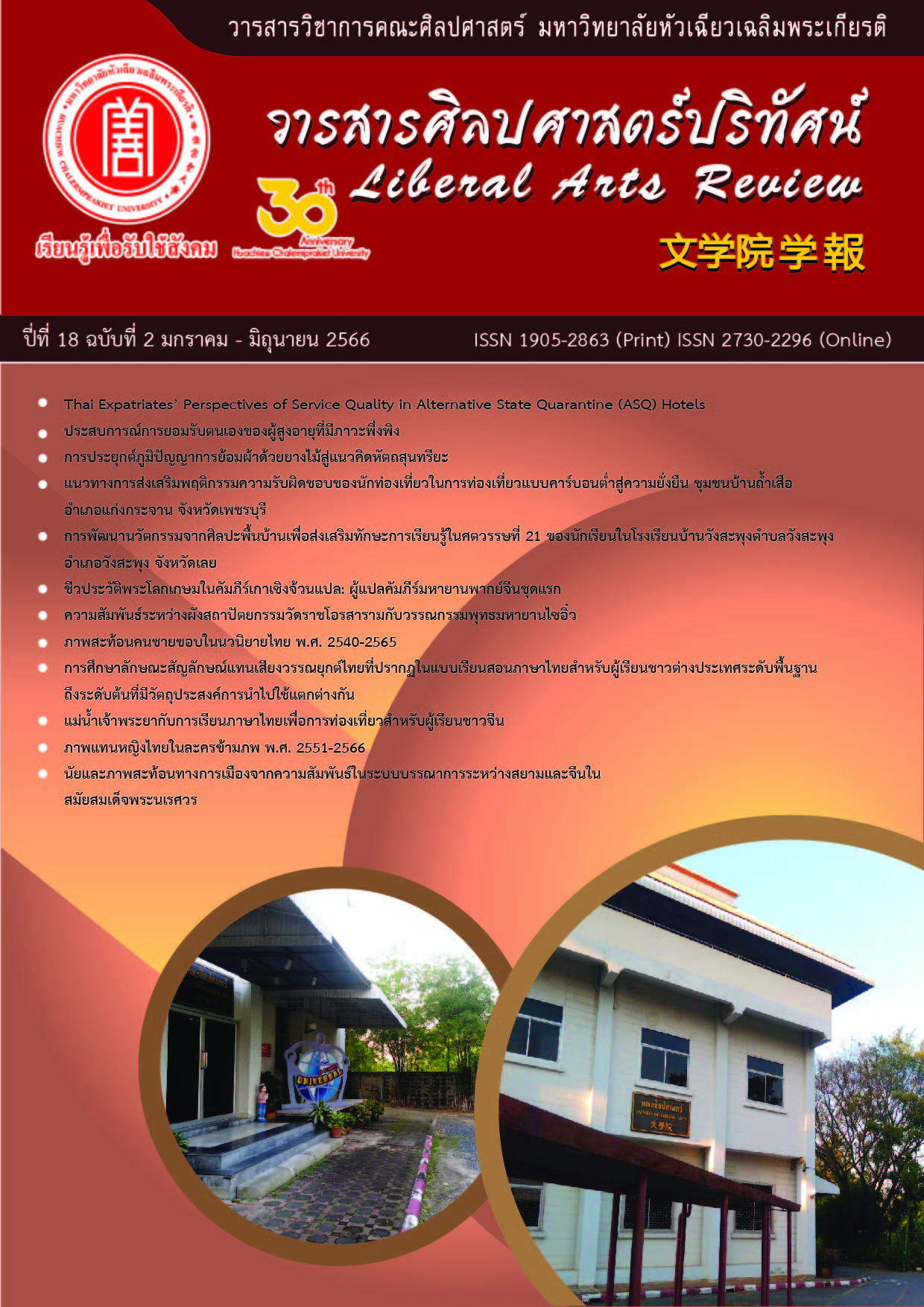Self- Acceptance Experiences of Dependent Older Adults
DOI:
https://doi.org/10.14456/lar.2023.11Keywords:
Self-acceptance, Dependent elderly, Qualitative studyAbstract
This study aimed to examine self-acceptance experiences of dependent older adults. Key informants consisted of five older adults who require assistance from others to perform independent activities of daily living. Data was collected via in-depth, semi-structured interview. Findings revealed three main themes of self-acceptance experiences. Theme 1 “declining health caused dependency” included four subthemes: 1.1) declining health resulted from illness and aging, 1.2) limitations in daily living led to dependency, 1.3) feelings of frustration worry and discourage when cannot do the activities like before, and 1.4) feeling uncomfortable in being a burden. Theme 2 “relationships and spiritual anchor helped one to make peace with themselves when relying on others” included two subthemes: 2.1) care and concern from other people and 2.2) religious practices and spiritual anchor. Theme 3 “understand existing changes, able to embrace dependency, and self-acceptance” included two subthemes: 3.1) realize and understand existing changes and eventually be able to embrace dependency and 3.2) accept oneself and embrace the changes.
References
กรมสุขภาพจิต. (2556). คู่มือ “ความสุข 5 มิติ” สำหรับผู้สูงอายุ (ฉบับปรับปรุง). ค้นคืนจาก https://www.dmh.go.th/ebook/view.asp?id=449.
กระทรวงสาธารณสุข. (2564ก). การประเมินโรคซึมเศร้า (9Q) ในกลุ่มผู้สูงอายุ ปีงบประมาณ2564. ค้นคืนจาก https://hdcservice.moph.go.th/hdc/reports/report.php?
กระทรวงสาธารณสุข. (2564ข). การคัดกรองความเครียด(ST-5)ในกลุ่มผู้สูงอายุ ปี งบประมาณ2564. ค้นคืนจาก https://hdcservice.moph.go.th/hdc/reports/report.php?
เกศกนก จงรัตน์, ศรีธยา ฤทธิ์ช่วยรอด, นันทวุฒิ วงศ์เมฆ และนิพนธ์ รัตนคช. (2562). ภาวะสุขภาพและคุณภาพชีวิตของผู้สูงอายุที่มีภาวะพึ่งพิง ในเขตเทศบาลเมืองทุ่งสง จังหวัดนครศรีธรรมราช. วารสารวิชาการสาธารณสุข, 28(6), 1013-1020. ค้นคืนจาก https://thaidj.org/index.php/JHS/article/view/8333.
ชาย โพธิสิตา. (2562). ศาสตร์และศิลป์แห่งการวิจัยเชิงคุณภาพ (พิมพ์ครั้งที่ 8). กรุงเทพมหานคร: อมรินทร์พริ้นติ้งฯ.
ณิชชารีย์ พิริยจรัสชัย และศิริพันธุ์ สาสัตย์. (2560). ปัจจัยทำนายความพร้อมของผู้ดูแลในการดูแลผู้สูงอายุที่มีภาวะพึ่งพาในระยะเปลี่ยนผ่านจากโรงพยาบาลสู่บ้าน. จุฬาลงกรณ์มหาวิทยาลัย, ค้นคืนจาก http://cuir.car.chula.ac.th/handle/123456789/59669.
พระมหายุทธนา นรเชฎโฐ และจุฑารัตน์ ทองอินจันทร์. (2561). รูปแบบการรักษาสุขภาพจิตเชิงพุทธบูรณาการ. ศิลปศาสตร์ปริทัศน์, 13(25), 141-152. ค้นคืนจาก https://so04.tci-thaijo.org/index.php/larhcu/article/view/143032.
พิมพนิต คอนดี, ณัฐสุดา เต้พันธ์ และกุลยา พิสิษฐ์สังฆการ. (2558). ผลของกลุ่มการปรึกษาเชิงจิตวิทยาแนวพุทธที่มีศิลปะเป็นสื่อต่อปัญญา การยอมรับและภาวะซึมเศร้าในบุคคลภายหลังการรักษาโรคมะเร็ง. จุฬาลงกรณ์มหาวิทยาลัย ม.ป.ท., ค้นคืนจาก http://doi.org/10.14457/CU.the.2015.811.
มูลนิธิสถาบันวิจัยและพัฒนาผู้สูงอายุไทย. (2562). สถานการณ์ผู้สูงอายุไทย พ.ศ. 2562 ค้นคืนจาก https://www.dop.go.th/download/knowledge/th1610945020-322_0.pdf.
โสภา หอยสังฆ์ และอรัญญา เชาวิลิต. (2541). ความต้องการการดูแลและการรับรู้การดูแลที่ได้รับจากครอบครัวของ ผู้สูงอายุในชนบท. (วิทยานิพนธ์พยาบาลศาสตร์มหาบัณฑิต สาขาการพยาบาลผู้ใหญ่) บัณฑิตวิทยาลัย : มหาวิทยาลัยสงขลานครินทร์, ค้นคืนจาก http://kb.psu.ac.th/psukb/handle/2553/1611.
Atchley, R. C. (1989). A continuity theory of normal aging. The Gerontologist, 29(2), 183-190.
Dryden, W. (2013). Unconditional self-acceptance and self-compassion. In The Strength of Self-Acceptance (pp. 107-120): Springer. Doi:https://doi.org/10.1007/978-1-4614-6806-6_7.
Flecha García, A. C. (2019). Self-acceptance and meaning/purpose of life between senior citizens residing in nursing homes. Pedagogía Social Revista Interuniversitaria(33). Doi: https://doi.org/10.7179/psri_2019.33.10.
Giorgi, A. P., & Giorgi, B. (2008). Phenomenological psychology. In The SAGE Handbook of qualitative research in Psychology (pp. 165–178). SAGE Publications.
Giorgi, A., Giorgi, B. & Morley, J. (2017). The Descriptive Phenomenological Psychological Method. In Willig & W. S. Rogers (Eds.), The SAGE Handbook of Qualitative Research in Psychology (2nd ed., pp. 176-192): SAGE. Doi:https://doi.org/10.4135/9781526405555.n11.
Hoffman, L., Lopez, A. J. & Moats, M. (2013). Humanistic psychology and self-acceptance. In The strength of self-acceptance (pp. 3-17): Springer, New York, NY. Doi:https://doi.org/10.1007/978-1-4614-6806-6_1.
Jitapunkul, S., Kamolratanakul, P. & Ebrahim, S. (1994). The meaning of activities of daily living in a Thai elderly population: Development of a new index. Age Ageing, 23(2), 97-101. Doi:https://doi.org/10.1093/ageing/23.2.97.
Laidlaw, K. (2013). Self-acceptance and aging: Using self-acceptance as a mediator of change in CBT with older people. In The strength of self-acceptance (pp. 263-279): Springer, New York, NY. Doi:https://doi.org/10.1007/978-1-4614-6806-6_15.
Rickelman, B. L., Gallman, L. & Parra, H. (1994). Attachment and quality of life in older, community-residing men. Nursing Research, 43(2), 68–72. Doi: https://doi.org/10.1097/00006199-199403000-00002.
Rogers, C. R. (1974). Psychotherapy and personality change. Chicago: University of Chicago.
Ryff, C. D. (1995). Psychological well-being in adult life. Current directions in psychological science, 4(4), 99-104. Doi:https://doi.org/10.1111/1467-8721.ep10772395.
Ryff, C. D. (2013). Psychological Well-Being Revisited: Advances in the Science and Practice of Eudaimonia. Psychotherapy and Psychosomatics, 83(1), 10-28. Doi:https://doi.org/10.1159/000353263.
Triningtyas, D. A. & Muhayati, S. (2019). Self Acceptance: a Study in the Elderly Age in Family Cempaka, Kabupaten Ngawi. Paper presented at the 2nd International Conference on Vocational Education and Training (ICOVET 2018) (pp. 111-112). Atlantis Press. Doi:https://doi.org/10.2991/icovet-18.2019.27.
Downloads
Published
How to Cite
Issue
Section
License
Copyright (c) 2023 Liberal Arts Review

This work is licensed under a Creative Commons Attribution-NonCommercial-NoDerivatives 4.0 International License.
บทความที่ได้รับการตีพิมพ์เป็นลิขสิทธิ์ของวารสารศิลปศาสตร์วิชาการและวิจัย
ข้อความที่ปรากฏในบทความแต่ละเรื่องในวารสารวิชาการเล่มนี้เป็นความคิดเห็นส่วนตัวของผู้เขียนแต่ละท่านไม่เกี่ยวข้องกับมหาวิทยาลัยหัวเฉียวเฉลิมพระเกียรติ และคณาจารย์ท่านอื่นๆ ในมหาวิทยาลัยฯ แต่อย่างใด ความรับผิดชอบองค์ประกอบทั้งหมดของบทความแต่ละเรื่องเป็นของผู้เขียนแต่ละท่าน หากมีความผิดพลาดใดๆ ผู้เขียนแต่ละท่านจะรับผิดชอบบทความของตนเองแต่ผู้เดียว




